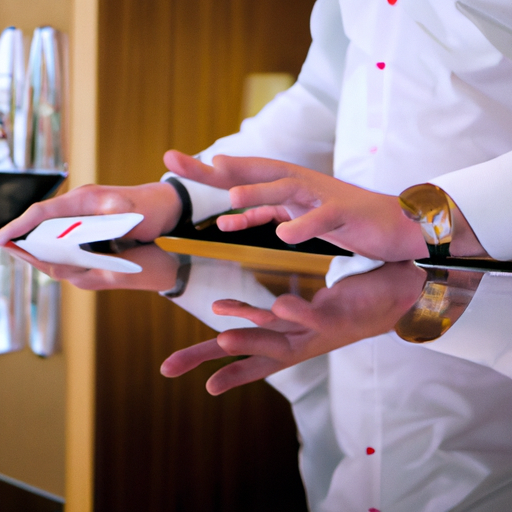
Leveraging Data Analytics for Targeted Marketing Strategies
In today’s digital age, data analytics has become an invaluable tool for businesses looking to drive revenue and build brand engagement. By leveraging the power of data, businesses can gain valuable insights into their customers’ preferences and behaviors, allowing them to create targeted marketing strategies that resonate with their target audience. In the hospitality industry, this is especially important, as competition is fierce and customer loyalty is crucial for success. In this article, we will explore five essential tips for leveraging data analytics to drive revenue and build brand engagement in the hospitality industry.
Tip 1: Collect and analyze customer data
The first step in leveraging data analytics for targeted marketing strategies is to collect and analyze customer data. This can be done through various channels, such as online surveys, social media monitoring, and website analytics. By understanding who your customers are, what they like, and how they behave, you can tailor your marketing efforts to meet their specific needs and preferences.
Tip 2: Segment your customer base
Once you have collected and analyzed customer data, the next step is to segment your customer base. This involves dividing your customers into different groups based on common characteristics, such as demographics, interests, and purchasing behavior. By segmenting your customer base, you can create targeted marketing campaigns that are more likely to resonate with each group, increasing the chances of driving revenue and building brand engagement.
Tip 3: Personalize your marketing messages
In today’s digital world, customers expect personalized experiences. By leveraging data analytics, you can personalize your marketing messages to make them more relevant and engaging to your target audience. For example, you can use customer data to send personalized emails with tailored offers and recommendations based on their past purchases or preferences. This level of personalization not only increases the chances of driving revenue but also helps to build a stronger connection between your brand and your customers.
Tip 4: Monitor and optimize your marketing campaigns
Data analytics allows you to monitor the performance of your marketing campaigns in real-time. By tracking key metrics such as click-through rates, conversion rates, and customer engagement, you can identify what is working and what is not. This enables you to make data-driven decisions and optimize your marketing campaigns for better results. For example, if you notice that a particular campaign is not performing well, you can make adjustments or try a different approach to improve its effectiveness.
Tip 5: Use predictive analytics to anticipate customer needs
Predictive analytics is a powerful tool that can help you anticipate customer needs and preferences. By analyzing historical data and patterns, you can make predictions about future customer behavior, allowing you to proactively meet their needs and exceed their expectations. For example, if you notice that a certain group of customers tends to book a spa treatment after staying at your hotel, you can proactively offer them a discounted spa package during their next visit. This not only drives revenue but also enhances the overall customer experience, leading to increased brand engagement and loyalty.
In conclusion, leveraging data analytics for targeted marketing strategies is essential for driving revenue and building brand engagement in the hospitality industry. By collecting and analyzing customer data, segmenting your customer base, personalizing your marketing messages, monitoring and optimizing your marketing campaigns, and using predictive analytics to anticipate customer needs, you can create more effective marketing strategies that resonate with your target audience. In today’s competitive landscape, businesses that embrace data analytics will have a significant advantage in driving revenue and building brand engagement.
Implementing Personalized Customer Experiences through Technology

In today’s digital age, technology plays a crucial role in every industry, including hospitality. Implementing personalized customer experiences through technology has become essential for driving revenue and building brand engagement. By leveraging the power of technology, hotels and restaurants can create memorable experiences that leave a lasting impression on their guests. In this article, we will explore five essential tips for implementing personalized customer experiences through technology in the hospitality industry.
First and foremost, it is important to understand your customers and their preferences. By collecting and analyzing data, you can gain valuable insights into your guests’ preferences, behaviors, and needs. This data can be collected through various touchpoints, such as online bookings, loyalty programs, and social media interactions. By understanding your customers on a deeper level, you can tailor your offerings and experiences to meet their specific needs and desires.
Once you have gathered the necessary data, the next step is to leverage technology to deliver personalized experiences. One effective way to do this is through the use of customer relationship management (CRM) systems. These systems allow you to store and manage customer data, track interactions, and create personalized marketing campaigns. By utilizing CRM systems, you can send targeted offers and promotions to specific customer segments, increasing the likelihood of conversion and repeat business.
Another important aspect of implementing personalized customer experiences is through the use of mobile technology. With the majority of people now owning smartphones, mobile apps have become a powerful tool for engaging with customers. By developing a mobile app for your hotel or restaurant, you can provide a seamless and personalized experience for your guests. This can include features such as mobile check-in, personalized recommendations, and in-app messaging for instant communication with your staff.
In addition to mobile apps, another technology that can greatly enhance the customer experience is the use of artificial intelligence (AI). AI-powered chatbots, for example, can provide instant assistance to guests, answering their questions and providing recommendations. This not only improves customer satisfaction but also frees up your staff to focus on more complex tasks. AI can also be used to analyze customer data and provide personalized recommendations, further enhancing the overall experience.
Lastly, it is important to continuously innovate and stay ahead of the curve when it comes to technology. The hospitality industry is constantly evolving, and new technologies are emerging all the time. By staying up to date with the latest trends and innovations, you can ensure that your hotel or restaurant remains competitive and continues to provide exceptional experiences for your guests. This can include exploring emerging technologies such as virtual reality, augmented reality, and voice assistants.
In conclusion, implementing personalized customer experiences through technology is essential for driving revenue and building brand engagement in the hospitality industry. By understanding your customers, leveraging technology, and continuously innovating, you can create memorable experiences that keep your guests coming back for more. So, embrace the power of technology and take your hospitality business to new heights.
Maximizing Social Media Platforms for Brand Awareness and Engagement
Social media has become an integral part of our lives, and businesses have quickly realized its potential for driving revenue and building brand engagement. With the rise of hybrid hospitality, it is essential for businesses to maximize their social media platforms for brand awareness and engagement. In this article, we will explore five essential tips to help businesses achieve this goal.
First and foremost, businesses should focus on creating a strong social media presence. This means having active accounts on popular platforms such as Facebook, Instagram, Twitter, and LinkedIn. By being present on these platforms, businesses can reach a wider audience and increase their brand visibility. It is important to regularly update these accounts with engaging content that resonates with the target audience.
One effective way to maximize social media platforms for brand awareness and engagement is by leveraging user-generated content. Encouraging customers to share their experiences with your brand on social media can create a sense of authenticity and trust. This can be done by running contests or campaigns that encourage customers to post pictures or videos using your products or services. By sharing this user-generated content on your social media accounts, you not only engage with your customers but also showcase the positive experiences others have had with your brand.
Another tip for maximizing social media platforms is to engage with your audience through interactive content. This can include polls, quizzes, or interactive stories that encourage your followers to actively participate. By creating interactive content, you not only increase engagement but also gather valuable insights about your audience’s preferences and interests. This information can then be used to tailor your marketing strategies and improve your overall brand experience.
In addition to interactive content, businesses should also focus on creating valuable and informative content. This can be in the form of blog posts, articles, or videos that provide useful information to your audience. By positioning yourself as an expert in your industry, you not only build trust with your audience but also establish your brand as a reliable source of information. This can lead to increased brand engagement and customer loyalty.
Lastly, businesses should not underestimate the power of influencer marketing on social media platforms. Collaborating with influencers who have a strong following and align with your brand values can significantly boost your brand awareness and engagement. By partnering with influencers, you can tap into their loyal fan base and leverage their influence to promote your products or services. This can be done through sponsored posts, product reviews, or even hosting giveaways in collaboration with influencers.
In conclusion, maximizing social media platforms for brand awareness and engagement is crucial in today’s digital age. By creating a strong social media presence, leveraging user-generated content, creating interactive and valuable content, and collaborating with influencers, businesses can drive revenue and build brand engagement. It is important to constantly analyze and adapt your social media strategies to stay relevant and effectively engage with your target audience. So, start implementing these essential tips today and watch your brand soar to new heights.


